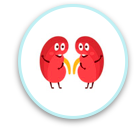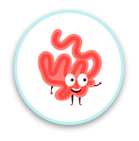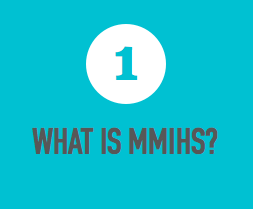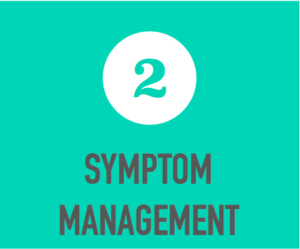Bladder and Kidney Treatment
 Most patients with MMIHS have a bladder that is unable to empty on its own either at all, or as regularly as it should. Therefore, the bladder becomes filled with an excessive amount of urine which causes it to become enlarged (megacystis.) An enlarged bladder can lead to complications of the kidneys (hydronephrosis) and even kidney failure if not treated properly. For this reason, it is critical that a bladder-emptying strategy be in place to keep the pressure on the bladder low and to prevent the upper urinary tract from deteriorating.
Most patients with MMIHS have a bladder that is unable to empty on its own either at all, or as regularly as it should. Therefore, the bladder becomes filled with an excessive amount of urine which causes it to become enlarged (megacystis.) An enlarged bladder can lead to complications of the kidneys (hydronephrosis) and even kidney failure if not treated properly. For this reason, it is critical that a bladder-emptying strategy be in place to keep the pressure on the bladder low and to prevent the upper urinary tract from deteriorating.
 Clean Intermittent Catheterization (CIC) along with possible use of antibiotics which decrease the risk of frequent Urinary Tract Infections (UTI) seems to be the optimal and most used strategy. CIC stands for Clean: as germ-free as possible. Intermittent: done on a regular schedule, many times a day. Catheterization: A tube is inserted into a person’s bladder via the urethra to drain the urine from the bladder.
Clean Intermittent Catheterization (CIC) along with possible use of antibiotics which decrease the risk of frequent Urinary Tract Infections (UTI) seems to be the optimal and most used strategy. CIC stands for Clean: as germ-free as possible. Intermittent: done on a regular schedule, many times a day. Catheterization: A tube is inserted into a person’s bladder via the urethra to drain the urine from the bladder.
In some cases, when a patient is not able to use a catheter that is inserted into the urethra, an indwelling catheter or suprapubic catheter can be surgically placed through a hole in the abdomen which allows the urine to continually drain into a bag.
Intestinal Treatment
 Intestinal Malrotation and lesions can be common in MMIHS patients and can be corrected with surgical intervention. However, the complications related to Intestinal Hypoperistalsis, or abnormally sluggish intestinal motility, is considered the more serious and difficult symptom to manage.
Intestinal Malrotation and lesions can be common in MMIHS patients and can be corrected with surgical intervention. However, the complications related to Intestinal Hypoperistalsis, or abnormally sluggish intestinal motility, is considered the more serious and difficult symptom to manage.
The primary goal of treatment is to provide the patient with adequate nutrition and to limit the enlarged abdomen that is caused by slow intestinal motility. MMIHS patients commonly have surgeries such as an ileostomy formation and/or an intestinal resection to help their bodies do just that. A feeding tube is also commonly used to provide as much intake as the body can handle. There are many different types of feeding tubes (nasal feeding tubes, gastric feeding tubes..) that can be used depending on the patient’s needs.
Unfortunately, for most MMIHS patients, surgical interventions alone are not able to allow their bodies to digest enough, if any actual food to get the nutrients that they need. For that reason, to some degree, a majority of patients with MMIHS rely on Total Parenteral Nutrition (TPN). TPN is a mixture of the essential nutrients a human body needs to survive. It is pumped into the body intravenously through a central line. Like the feeding tube, there are various types of central lines (PICC, tunneled catheter, non-tunneled catheter, implanted port) that can be used based on the patient’s needs. The central line, along with the feeding tube are some of the “accessories” that help MMIHS patients lead a more “normal” life.
The Treatment Team
Along side the family, It takes a team of dedicated and experienced members of the medical community to provide the exquisite care that a patient with MMIHS requires. This team may include, but is not limited to:
- Gastroenterologist
- Pediatric Surgeon
- Urologist
- GI surgeon
- Nephrologist
- Transplant Team (if applicable)
- Hematologist (as needed)
- Pediatrician
- Dietician
- Psychologist
- Play Therapist (age appropriate)
- Music Therapist
The Treatment Team
Please note: The information on this website was generated by a group of MMIHS families primarily based in the US. We recognize that care, practice and protocol vary by location and individual and it is not the intention of MMIHS.ORG to provide specific medical advice but rather to share the knowledge and experience available to us and provide universal information to help patients or their loved ones to better understand their health, diagnosed condition, and the current range of approaches related to treatment.
We continually strive to provide the most up to date and accurate information possible so we encourage you to utilize the contact page to get in touch if you have any questions, comments, or input regarding content on the website.



